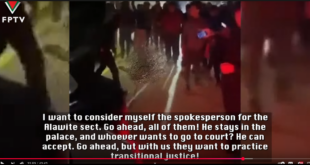Nov 3, 2013, Global Research
In a report titled “Hezbollah shows strain of Syria war”, The Guardian’s Middle East Editor Ian Black, explains to the reader that Hezbollah leader Sayyed Hassan Nasrallah “sounds more troubled than defiant when he talks about the Syrian war these days”.
Black doesn’t offer the reader a link to Nasrallah’s latest speech to check, nor any translation off this supposed “troubled” tone, nor indeed a single quote. Instead Black offers the reader his own insight into the Hezbollah leaders mindset, bolstered by none other than Zionist agitprop extraordinaire: Matt Levitt. The Guardian also fail to disclose Mr. Levitts’ correct bio, or the fact he is employed by the propaganda arm of the Israel lobby (AIPAC), otherwise known as the Washington institute for Near East Policy, (WINEP).
It comes across as immediately contradictory, then, that Black follows this baseless assertion with a reminder that Nasrallah “lambasted” Saudi Arabia for trying to block a political solution in Syria. It’s almost as if Black is disappointed that his subject isn’t calling for further bloodshed. Not only did Nasrallah “lambast” Saudi Arabia, he pointed the finger at the Saud monarchy for the continuing violence, alluding to the Saudis proxy in Lebanon (March 14/Hariri), Nasrallah said: “All the events in Syria are tied to the events in Lebanon because there is a certain party that has linked everything in Lebanon to what is happening in Syria. They are disrupting political life as they wait for the result of the events in Syria to impose their own conditions.”
Further, in a more direct attack on the Saudis, Nasrallah states: “Saudi Arabia is angry with the way things are going in Syria and is seeking to disrupt and postpone the Geneva II Conference. Disrupting the political solution in Syria means more destruction, more victims, more killing.” Troubled, maybe, but a lack of defiance?
The Guardian report goes on to state that “Thousands of [Hezbollah] men have been deployed in Damascus, Deraa, Homs and Aleppo. Casualty figures are estimated at around 200 killed.” The vague number of “thousands” is a rather broad term, is it two thousand, or ten thousand? Mr. Black, nor the Guardian, have the faintest idea, but “thousands” sounds about right; the Israeli’s favourite American propagandist Matt Levitt told them no doubt. Black’s report claims the organisation is “fatigued and overstretched”, again, he doesn’t provide any evidence for this description, nor a name for the quote itself, it’s just an anonymous breath of fresh air that Black expects his reader to lap-up without question, the author is quite literally placing unattributable, baseless, fabrications to fit his desired narrative.
Black tells the reader that “blowback” has come to Lebanon, as a result of Hezbollah’s incursion into Syria, he again fails to add the relevant context that Lebanese/Syrian border towns had been attacked by extremist Syrian “rebels” for months prior to Hezbollah taking any action. Moreover, Black omits that Al Qaeda ideologues and extremists have used Lebanon’s porous border with Syria as a staging ground and logistics hub to launch the Syrian insurgency since virtually the first week of the crisis; feeding fighters and arms through sympathetic parties – including members of the March 14th alliance MP Okab Sakr and the assassinated former intelligence Chief Wissam a-Hassan to name but two. “Blowback” was indeed inevitable, whether Hezbollah made attempts to curtail this Saudi/Hariri arms pipeline to Al Qaeda in Syria, or not.
Without a single mention of the complete illegality of such aggression, Black then goes on to describe how Israel’s latest extra-judicial murder through air-strike is a “set-back” for Hezbollah, the sixth “raid” in the last few months no less! Aren’t those Israeli’s just great guys? Of course, the target – and we all know how well Israel hit their targets – were supposed SAM’s being transferred from Syria to Hezbollah. Again, not a scrap of evidence has been provided for this claim, or the airstrike itself, other than vague reports from opposition belligerents and eager-to-leak anonymous US “officials”. Equally disconcerting, Black fails to mention that even if such deliveries were being made to Hezbollah, the Israeli “raids” are still a total violation of International Law. Not only this, a surface to air missile system is zero “threat” to his beloved Israel, these systems serve one purpose: shooting things out of the sky. It is primarily a defensive weapon ostensibly used against attacking aircraft; you know, the Israeli aircraft that flaunt international law and bomb Arab countries and murder their civilians with impunity. In the Guardian and Ian Blacks’ eyes, such deterrence is a no-go, indeed, Black points out with glee the new possibilities the Syria conflict has provided the Israeli airforce: “The lesson is that the war in Syria, now in its third bloody year, makes it much easier for the Israelis to strike at Hezbollah without provoking a response. Nasrallah and Assad already have quite enough on their plates.” Blacks’ disguised pleasure in Israel’s new-found ease to bomb Arabs with impunity seems hard for him to conceal.
An equally fact-free assumption follows when Black states that: “Iran’s support for Assad [is] probably far more significant than assistance to the rebels from the Gulf states”. There are a multitude of things wrong with this vapid sentence. Does an editor often include “probably” when discussing such issues? Does Mr. Black provide any evidence that his assumption may be held in fact and not fantasy? And does Mr. Black realise, after three years of having the opportunity, that the Syrian Army and Government is a state-actor perfectly entitled to receive any support it requires from its allies? On the other hand, the “rebels” are a plethora of non-state extremist and criminal militia waging a terrorist insurgency upon a state and its infrastructure. Yet, for some strange reason, Mr. Black continues to place these two belligerents on some sort of moral and legal equal footing. Black attempts to bolster this blatant duplicity with a link to the recently released footage of Iranian revolutionary guards operating in Syria: This dubious “evidence” of “far more significant” Iranian assistance – even if proven – pales in comparison to the tonnes of footage of foreign fighters, and reems of reports on the foreign actors arming and funding the opposition to the tune of billions of dollars. It is virtually the first time in almost three years that IRGC personnel have allegedly been seen in Syria.
Black ends his Israeli propaganda fluff-piece by pitching “terrorist expert” Mathew Levitt’s latest book of fabrications and baseless speculation. Alluding to the marine barracks bombing of October 1983, Black tells us that the “US intercepted” a message (yes, you guessed it, the ever-trustworthy Middle East SIGINT of the US, aka: Israel) from the Iranian intelligence ministry to their Damascus ambassador: “It instructed Iran’s ambassador in Damascus, Ali Akbar Mohtashemi, to contact Hussein al-Musawi, the leader of Islamic Amal (a precursor to Hezbollah) and to direct him to “take spectacular action” against the Americans. The warning did not prevent the attack, which killed 241 US and 58 French personnel.” Contrary to this “precursor” narrative, and in spite of decades of strenuous Israeli/American efforts to tie Hezbollah directly to the marine barracks attack; there is zero evidence to suggest that Hezbollah as a formal group participated in the bombing.
Black is once again playing loose with the facts. Musawi was indeed a founding member of Islamic Amal, a splinter group of the Shi’a Amal movement (an intermittent foe of Hezbollah) formed during the Lebanese civil war, and indeed, his group did pledge allegiance to Iran. Musawi himself later joined Hezbollah and served on the consultative council – before Israel assassinated him. Accordingly, there were several such Shi’a groups operating at the time of the civil war, most of which became part of Hezbollah prior to its official formation in 1985 – two years after the marine barracks bombing. Whether Musawi and others participated in the bombing and subsequently became members of Hezbollah is far too nuanced a point to include in this pathetic attempt to demonize Israel’s enemy.
Black’s article provides yet another example of how western Middle East Editors, when discussing the Arab world, invariably parrot Israeli propaganda with scant regard for relevant context or the facts.
 Syria Support Movement solidarity with the Syrian people
Syria Support Movement solidarity with the Syrian people





